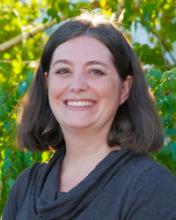 Like many faculty members, Professor Katrina Hoyer is busy running a lab, teaching and researching. This year, she adds another item to her to-do list – learning how public policy is implemented and how she can advocate for policy that affects her research.
Like many faculty members, Professor Katrina Hoyer is busy running a lab, teaching and researching. This year, she adds another item to her to-do list – learning how public policy is implemented and how she can advocate for policy that affects her research.
Hoyer has been named one of 10 public policy fellows in the American Association of Immunologists (AAI) Public Policy Fellows Program, a year‐long program offering postdocs and junior faculty the opportunity to learn about and participate in public policy and legislative activities affecting biomedical research.
“Now that I run my own lab, I see how important public policy is to my career and the careers of the students I mentor,” said Hoyer, who researches autoimmune diseases with the School of Natural Sciences. “And not just from a funding perspective, either. Yes, policy affects funding, but it also affects the kind of research we do.”
In turn, that affects the community at large. Research grants not only buy equipment and supplies, often from area vendors, but they also pay the salaries of laboratory staff and graduate student researchers. Those students contribute to the local economy while in school, and can help enrich the community after graduation.
Additionally, the research – into such health concerns as autoimmune and inflammatory diseases like colitis, autoimmune anemia, lupus and pancreatitis – could affect people locally and around the world.
Over the coming year, Hoyer will attend monthly teleconferences with other fellows and leaders from the AAI, who will help the fellows learn how to communicate about immunology for legislative audiences and how the processes of funding approval and legislation work.
At the end of the year, Hoyer will go to Washington, D.C., for an up-close look at legislators at work, and meet with officials who represent UC Merced, the region and the state.
The fellowship aims to help people understand the role of the president and the administration in policy decisions, as well as the parts Congress and the National Institutes of Health play in determining policies that affect biomedical research.
“The fellowship is definitely an honor,” Hoyer said. “I’ll get the chance to network with some of the AAI’s most senior members.”
The century-old AAI is the world’s largest professional association of research scientists and physicians who are experts on the immune system, with more than 7,600 members.
But the AAI is certainly not the only group that lobbies for money and attention.
Hoyer understands that with so many demands for funding, legislators must make tough decisions. That’s why being able to talk in clear and concise language about her research into immunology could make a big difference.
“We’re going to need public and private support,” Hoyer said. “I think the public does support science, but the question is whether society wants to pay for it.
“The research we do has a huge impact on health care, and you never know where the next big breakthrough will come from, thus funding and supporting basic science research is critically important to the future of healthcare.”
Media Contact

